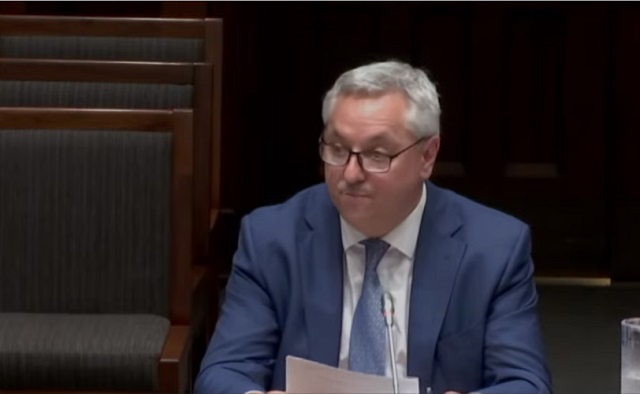Bruce Dowbiggin
When Leadership Fails: Add Panic And Stir
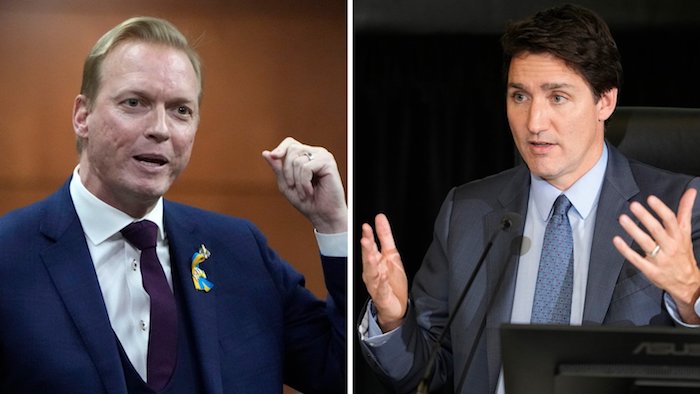
High comedy this week from pearl clutchers in the Land of Woke. They are currently having a sacred cow about the crackdown on Chinese protesting brutal Covid restrictions in that country. Indignation and virtuous rage being the popular responses. These would be the same people who lustily cheered Prime Minister Justin Trudeau employing mounted police while seizing bank accounts of truckers protesting Covid restrictions in February. Because honking.
Yes, panic is in the eye of the beholder. As a legal standard it leaves a little something to be desired. But in Canadian politics you take what you can get when trying to whip up an emergency. And do your best to censor the rest.
The Public Order Emergency Commission and the new Alberta Sovereignty Act both require that the Canadian public see some imminent threat to justify shifting the status quo. In the case of the interminable POEC proceedings a perceived sense of urgency— a threat to national security— convinced the prime minister to adopt sweeping powers to financially crush a rowdy band of truckers who parked on Ottawa’s Wellington Street for three weeks or so.

Despite no significant police or jurisdictional body publicly urging him to pull the pin on the Emergency Measures Act— besides a legal opinion no one is allowed to see— Trudeau saw his dramatis persona as the last bulwark against chaos. Drama teacher as hero. So he went full Duchy of Fenwick.
Forget that the Ottawa Police Service, the OPP and RCMP were finally operating as a joint command, working on the plan that would finally clear the capital’s streets later in the week. Trudeau called in the lawyers and the bankers to stifle dissent. And portrayed himself as put-upon Lincoln by rebels.

The problem in stoking this panic is that the Ottawa segment of the pushback by truckers was the least significant of three major Covid pushbacks in February/ March 2022. The most serious— the blockade of the Ambassador Bridge between Windsor, Ont., and Detroit, Michigan— was wound up through negotiations and a few tow trucks in a matter of days.
The second— the blockade of the vital Coutts, Alberta, crossing to the U.S.— was more vexing, with Ottawa and the Alberta’s government passing the hot potato on the problem. There were allegations of armed vigilantes and irreparable harm to Canada/ U.S. trade. But this, too, was settled without bloodshed or mounted police charging into crowds. Or the Emergency Measures Act.
In both cases leadership prevailed. The third episode was the truck protest on Wellington street that spiralled out of control when civic, provincial and federal authorities all expected some one else to solve a traffic problem. From the prime minister— who deigned to meet the unwashed mass of truckers— down to the Ottawa police chief, avoidance, not leadership, seemed the solution.
In comparison to the two other crises, it would be hard to describe what Trudeau faced as a national crisis. The airport, train station, stores, vital utilities and Parliament itself functioned as they had under the government’s own restrictive Covid regulations. The protesters were not that far removed from the homeless encampments in public parks, sidewalks and under bridges that refused to budge for six months or more. (Okay, the truckers honked horns instead of criminal drug dealing and sexual assault.) The homeless-crew protests were as thoroughly political in their goals and methods as were the Convoy bunch.
For the PM, however, the images of Bouncy Castles and open-air concerts broadcast to the world were intolerable. Embarrassing. Galling. “The protesters didn’t just want to be heard, they wanted to be obeyed,” he said. “The situation was out of control, with the potential for violence, not just in Ottawa but across the country.”
And he’d done nothing to create this conflagration, he claimed. In the POEC hearings, using his glassy Montgomery Clift voice, Trudeau swore under oath he’d never described the protesters as anti-science misogynists and racists. He then declared himself satisfied at having stanched the alt-right hordes, locking up their leaders and braving the sarcasm of the foreign press.
His purchased media concurred, projecting public urination and honking trucks into armed white supremacy. They made up arson stories. Pollsters, too, told him Canadians in general didn’t like the image of the plebes who deliver their crudités and cheap Chinese clothing acting like Trump Americans. This was a can’t-miss.
He saw panic, he’d looked it in the eye, and now he was “serene”. He also knows that in in the contemporary “Victims ‘R Us” culture he can get away with anything he damn well pleases if it creates panic. Hell, he’d called Canadians genocidal at the UN, and no one flinched. Who’d start holding him accountable now?
Alberta’s new premier Danielle Smith has the opposite “panic” problem. She has little assurance that the agitated conditions she cited Tuesday will warm her province to the Alberta Sovereignty Act. But to get them to go along she must rile up enough of the Conservatives traditional base that Ottawa is coming to to destroy the oil patch, seize their guns and impose more harsh Covid lockdowns.

As opposed to Trudeau, Smith does not have a media sussing out Putin and Confederate flags for her. The same Edmonton-based opinion makers harassed her predecessor Jason Kenny into resignation over his handling of the Covid protocols since 2020. (No surprise that Smith rapidly cashiered the upper echelons of Alberta’s healthcare bureaucracy and championed the non-vaccinated citizens who, she said, had been rendered second-class citizens for rejecting what we now know was a flawed and perhaps dangerous vaccine program.)
Smith’s biggest impediment to creating indignation— in what is now a far more progressive electorate— is the recent boom in Alberta’s financial situation. Put simply, the province is again awash in cash, the government is declaring a $4 billion-plus surplus and Albertans are once again engaging in their traditional Hawaii, Palm Springs and Scottsdale retreats.
Smith is already spreading out that largesse to families, senior citizens, gas prices and more. Will it work? “The Land Is Strong But Ottawa Is Wrong” is a wobbly campaign slogan to take into next spring’s provincial election. Her polling is terrible, and the sale on Alberta Sovereignty is a long shot.
Maybe Saskatchewan will join in, but who knows? When you play with the panic bull you sometimes get the horn. Unless you’re Justin Trudeau and you have Jagmeet Singh in your pocket. Then you’re “serene”.
Sign up today for Not The Public Broadcaster newsletters. Hot takes/ cool slants on sports and current affairs. Have the latest columns delivered to your mail box. Tell your friends to join, too. Always provocative, always independent.
Bruce Dowbiggin @dowbboy is the editor of Not The Public Broadcaster A two-time winner of the Gemini Award as Canada’s top television sports broadcaster, he’s a regular contributor to Sirius XM Canada Talks Ch. 167. Inexact Science: The Six Most Compelling Draft Years In NHL History, his new book with his son Evan, was voted the seventh-best professional hockey book of all time by bookauthority.org . His 2004 book Money Players was voted sixth best on the same list, and is available via http://brucedowbigginbooks.ca/book-personalaccount.aspx
Bruce Dowbiggin
Coyotes Ugly: The Sad Obsession Of Gary Bettman

It came to this. Playing in the 6,000 seat Mullet Arena on the campus of Arizona State. Owned by a luckless guy who eschewed the public spotlight. Out of the playoffs, their bags packed for who knows where, the Arizona (née Phoenix) Coyotes gave an appreciative wave to the tiny crowd gathered to say Thanks For The Memories.
With that they were history. Although NHL commissioner-for-life Gary Bettman has promised the last in a set of hapless owners that he can revive the franchise for a cool billion should he build the rink that no one was willing to build for the Yotes the past 20 years.
The Arizona Republic said good riddance. “Metro Phoenix lost the Coyotes because we are an oversaturated professional and college sports market with an endless supply of sunshine and recreational choices. Arizona may have dodged a slapshot:
We have the NFL Cardinals, the MLB Diamondbacks, the NBA Suns, MLB spring training, the WM Phoenix Open, the Phoenix Rising, the WNBA Mercury, the Indoor Football League Rattlers and the Arizona State Sun Devils. There hasn’t been a household name on the Coyotes since Shane Doan, and half of Phoenix probably doesn’t know who he was”.
Likely they’ll be a financial success in Salt Lake City where there’s a viable owner, lots of money and a will to make it work. They’ll need a will because— stop me if you’ve heard this before about the Coyotes— the rink they’ll play in this fall has only 12,500 unobstructed views for hockey.
Watching this farce we recalled getting a call from Blackberry co-founder Jim Balsillie in 2008, shortly after our book Money Players was a finalist for the Canadian Business Book of The Year. We’d written a fair bit about the Coyotes in our work and someone had told Balsillie we might be the ones to talk to about a plan he was concocting to buy the bankrupt Coyotes and eventually move them to Hamilton.

Balsillie was salty over the way he’d been used as a stalking horse in the financial troubles of the Pittsburgh Penguins in 1990s. Flush with money from the huge success of RIM, Balsillie offered to buy the Pens, with an eye to moving them to southern Ontario if Pittsburgh didn’t help build a new arena for the team.
In time, Balsillie saw that Bettman was only trying to protect the investment Mario Lemieux and others had in the Pens. Balsillie was the black hat who eventually spooked Pittsburgh into giving the current owners what they wanted. At the end of the day, Mario got his money and Balsillie was given a “thanks for trying”: parting gift of nebulous promises.
Still smarting, Balsille vowed not to be used again. in his desire to bring the NHL to southern Ontario. So when the Coyotes owner Jerry Moyes threw the keys to the team on Bettman’s desk, he saw an opening in the bankruptcy that followed. Seeing Bettman as the impediment, Balsillie decided to buy the team out of bankruptcy, a process the NHL could not legally prevent.
What Balsillie wanted to know was “What then? How would Bettman fight back?” We told him that no one flouts Bettman’s authority within the NHL. (All the current owners since 1993 have come aboard on his watch.) And that he’d have to get the Board of Governors to approve his purchase. Odds: Nil.
That’s what happened. Rather than admit that the Valley of the Sun was poisoned for hockey, Bettman found another series of undercapitalized marks to front the franchise while the league quietly propped up the operation. No longer was the Coyotes’ failure about the fans of Arizona. It was about Gary Bettman’s pride.

Protestors stand outside a press conference in Tempe featuring Arizona Coyotes executives discussing propositions related to a new arena and entertainment district. (Photo by Brooklyn Hall/ Cronkite News)
Where he had meekly let Atlanta move to Winnipeg he fought like hell to save Arizona. And his power. (His obstinacy on U.S. network TV is another story.)
Fast forward to last week and the abject failure of that process. The Arizona Republic naively fawned on Bettman for his many attempts to save the team. In fact, they were just attempts to buttress his grip on the league. While the Coyotes may have been a mess, Bettman has succeeded in preserving the investments of most of the business people who bought his NHL business prospectus.
Sometimes it meant riding into Calgary to chastise the locals for their parsimony in not giving the Flames a new rink. Ditto for Edmonton. Ditto for Winnipeg and other cities. Other times it was to shore up weak partners to protect the equity of other prosperous cities. Sometimes it was to tell Quebec City, “Not gonna’ happen.”
For his loyalty to the owners and through some luck— Gretzky to the Kings— Bettman has made the NHL work in places no one might’ve imagined. Nashville. Raleigh. Tampa. Las Vegas. Dallas. Not at the level of the NFL, NBA or MLB, but at a comfortable equity-affirming status. Nothing happens without his say-so in the NHL. Or without him getting credit. Secondary NHL execs who wanted credit for their innovations were quietly punted.
When Houston finally gets a franchise from Gary they’ll part with $1.5 billion for the honour. While the commissioner has played down new franchises and expanded playoffs, you can bet your last dollar that he’s told owners they’re in line for more expansion cash— cash they don’t have to split with players in collective bargaining.
One more certainty. As long as Bettman rules the NHL you won’t see an NHL team back in Arizona.
Bruce Dowbiggin @dowbboy is the editor of Not The Public Broadcaster A two-time winner of the Gemini Award as Canada’s top television sports broadcaster, he’s a regular contributor to Sirius XM Canada Talks Ch. 167. Inexact Science: The Six Most Compelling Draft Years In NHL History, his new book with his son Evan, was voted the seventh-best professional hockey book of all time by bookauthority.org . His 2004 book Money Players was voted sixth best on the same list, and is available via brucedowbigginbooks.ca.
Bruce Dowbiggin
Why Are Canadian Mayors So Far Left And Out Of Touch?

‘The City of Edmonton pays for a 22-person climate team but doesn’t know who on that team is responsible for what, or what that team has accomplished. Meanwhile, Council takes a pay raise and bumps our property taxes by 8.6%” @michaelistuart
We just returned from a long trip to discover that the City of Calgary wants to potentially re-zone our neighbourhood. Bridle Estates is a collection of 175 bungalow villas for people aged 55-plus. While some people still work most of the inhabitants are retirees. The city’s earnest idea is to create low-cost housing for the tens of thousands arriving here in the city from away.
You can see why a city hall obsessed with white privilege wants to democratize our neck of the south-west corner of the city. Enforced justice has a great tradition. 1970s American cities decided that bussing was the antidote to segregation. After a SCOTUS decision allowing the practice in 1971 (back when liberals owned the court) progressives pushed through an aggressive plan to bus kids from the inner city to the leafy suburbs. And vice versa.
It worked like a charm. For conservatives, that is. It radicalized a generation of voters who soon installed Ronald Reagan as president, and empty buses went back to the depot. The Democrats went from the party of the people to the party people in Hollywood. With time dulling memories, contemporary Woke folk are reviving the integration dream. This time the mostly white suburbs will bear the brunt of the government’s immigration fixation (400K-plus in the third quarter).

There are meetings planned where citizens will be able to address their elected officials— no doubt in a respectful voice. But anyone who’s dealt with Climate Crisis Barbie— Mayor Jyoti Gondek— has much optimism. This is a mayor who exploited a three-way split in centre-right voting here to declare a Climate Emergency on her first day in office.
Then she rolled out hate-speech laws to protect her from being razzed in public. For this and other fabulist blunders— her messing with the new arena project drove a worse deal and a two-year delay in a home for the Calgary Flames— she faced a recall project (which failed to collect over 400K voters’ signatures).
With a housing bubble expanding everyday, Her Tone Deafness has decided that owning a home is so passé. ”We are starting to see a segment of the population reject this idea of owning a home and they are moving towards rental, because it gives them more freedom.” She added that people have become “much more liberated around what housing looks like and what the tenure of housing looks like.”
As the Calgary’s schmozzles and Edmonton’s dabble in climate extravagance illustrate the municipal level of government in Canada is a few lobsters shy of a clambake. Across the country major cities are in the hands of radical NDP soldiers or virtue warriors who would rather have symbols than sewers to talk about.
In Toronto, Jack Layton’s widow Olivia Chow is leveraging her 37 percent mandate to make Toronto a kinder, Wok-er city. In Vancouver and Victoria, B.C., the open-air drug agendas of new mayors and city councils have sent capital fleeing elsewhere. Despite crime and construction chaos, Montreal mayor Valerie Plante won a second term, by emphasizing her gender.

In times when the coffers were full, this ESG theatre might have been a simple inconvenience. But since the federal and provincial governments began shoving responsibilities and costs downward to municipalities there is no wiggle room for grandstanding politicians at the city level. Or for hapless amateurs.
With the public incensed over residential property tax increases on one side and the blandishments of aggressive developers on the other, competent governance has never been more needed in the urban areas. While feds can (and have) printed money to escape their headaches and the provinces can offload costs onto the cities, the municipalities have no room for risk.
The time bomb in this equation is the debt load that the three levels can sustain. After this week’s budget, federal spending is up $238B, or 80 percent since 2015. Coming off this free-spending budget the feds have pushed the federal debt to more than $1.2 trillion this year (in 2015, the debt was $616 billion.) None of the provinces has shown any appetite for the 1990s-style cuts to reduce their indebtedness. Leaving cities to crank the property-tax handle again.
So far, Canada’s cities have been able to use friendly municipal bonds to ease their fiscal problems. But if the Canadian economy continues its tepid performance with no reduction in debt, financial experts tell us that there could be a flight from Canadian municipal bonds— with a consequent spike in interest rates elsewhere.
The backlash on free-spending governments will be severe— and restricted municipalities will be hardest hit. None of this is resonating with Canadians still flush with cash from Covid. The stock markets are still buoyant and those living in cashbox houses are counting their dividends. Willful denial is the Trudeau legacy.

Which is why so many Canadian were shocked last week when American AntiTrump media star Bill Maher did an intervention on Canadian conceits. Using the True North as his warning to America, Maher ripped apart the gauzy leftist dream of Canada as the perfect society, the Sweden north of Estevan. By the time he was done, the single-payer myth was bleeding on the ground.
Maher knows that the bill is coming due for free-spending Canada and its climate charlatans. (The IMF is already warning of a global crisis over debt loads.) The question is: will Canadians come to the same conclusion before it’s too late to save the cities?
Bruce Dowbiggin @dowbboy is the editor of Not The Public Broadcaster A two-time winner of the Gemini Award as Canada’s top television sports broadcaster, he’s a regular contributor to Sirius XM Canada Talks Ch. 167. His new book Deal With It: The Trades That Stunned The NHL And Changed hockey is now available on Amazon. Inexact Science: The Six Most Compelling Draft Years In NHL History, his previous book with his son Evan, was voted the seventh-best professional hockey book of all time by bookauthority.org . His 2004 book Money Players was voted sixth best on the same list, and is available via brucedowbigginbooks.ca.
-

 Business2 days ago
Business2 days agoMaxime Bernier warns Canadians of Trudeau’s plan to implement WEF global tax regime
-

 Censorship Industrial Complex17 hours ago
Censorship Industrial Complex17 hours agoDesperate Liberals move to stop MPs from calling Trudeau ‘corrupt’
-

 COVID-192 days ago
COVID-192 days agoWHO Official Admits the Truth About Passports
-

 International1 day ago
International1 day agoUN attacks stay-at-home motherhood as ‘gender inequality’
-
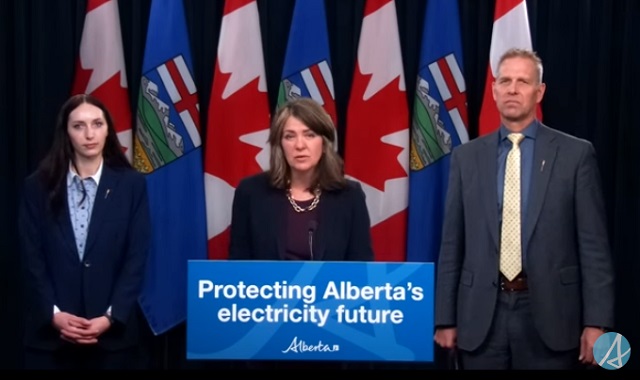
 Alberta1 day ago
Alberta1 day agoProvince to stop municipalities overcharging on utility bills
-
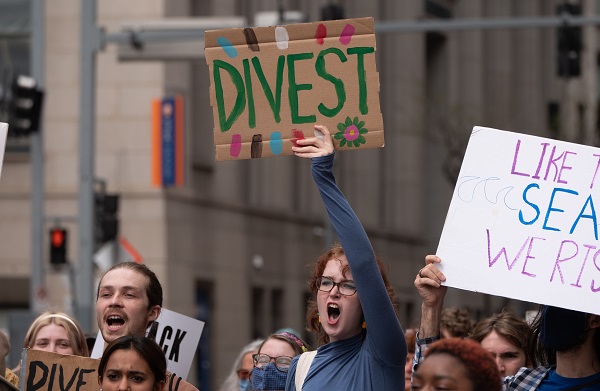
 Energy1 day ago
Energy1 day agoAnti-LNG activists have decided that they now actually care for LNG investors after years of calling to divest
-

 Alberta1 day ago
Alberta1 day agoAlberta government should create flat 8% personal and business income tax rate in Alberta
-
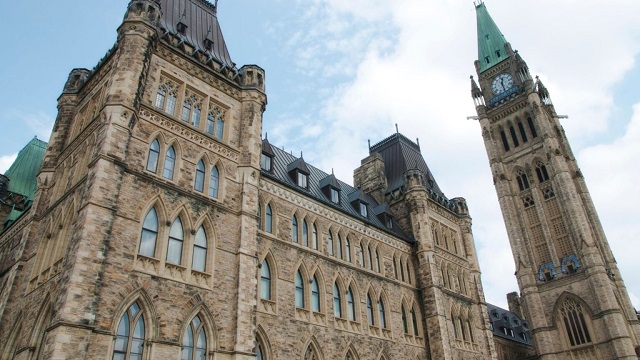
 Freedom Convoy2 days ago
Freedom Convoy2 days agoOttawa spent “excessive” $2.2 million fighting Emergencies Act challenge







